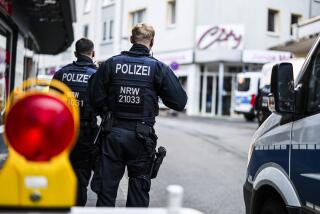‘Crystal Night’ Speech Sparks Walkout in Bonn
- Share via
BONN — The official ceremony in the West German Parliament commemorating the 50th anniversary of Kristallnacht, the pogrom that marked the beginning of the Nazis’ drive against the Jews, was marred Thursday when many deputies walked out of the chamber in protest against a senior lawmaker’s address.
They said the speech by Bundestag President Philipp Jenninger was not respectful enough to the memory of the thousands of Jews whose homes, businesses, and synagogues were pillaged on the night of Nov. 9-10, 1938. Kristallnacht --”Crystal Night” or “night of the broken glass”--so-called for the glass shattered during the Nazi rampage throughout Germany--ushered in the Holocaust against the Jews of Europe.
Jenninger, 56, as Speaker of the legislature, gave the address. Invited guests included West German President Richard von Weizsaecker and Heinz Galinski, leader of West Germany’s surviving Jewish community of 30,000.
‘Glorious Times’
At one point in his 26-page speech--part of an hourlong, nationally televised service commemorating Kristallnacht --Jenninger said that the years 1933 to 1938 were “fascinating,” even though what followed devastated Germany and the Jews.
“Didn’t (Adolf) Hitler bring to reality what Wilhelm II (German emperor before and during World War I) had only promised, that is, to lead the Germans to glorious times?” he asked rhetorically in an apparent attempt to explain the German people’s fascination and devotion to Hitler. “Wasn’t he chosen by providence, a fuehrer such as is given to a people only once in a thousand years?
“The years from 1933 to 1938, even from a distant retrospective and in the knowledge of what followed, still are a fascinating thing today, since throughout history there was hardly a parallel to Hitler’s triumphal procession during the first years.”
Jenninger said that Hitler, who became chancellor of Germany in 1933, turned mass unemployment into full employment and mass poverty into a comfortable living for most Germans and that he turned hopelessness into optimism and self-confidence.
He cited Hitler’s reincorporation of the Saarland into Germany, introduction of general military service, massive rearmament, the occupation of the Rhineland, the annexation of Austria and the Munich agreement that sealed the fate of Czechoslovakia.
“For the fate of the Germans and European Jews,” Jenninger added, “Hitler’s successes were perhaps even more disastrous than his crimes and misdeeds.”
As Jenninger spoke, many legislators of the opposition Social Democratic Party and the Greens party walked out of the chamber, accompanied by some members of the Free Democratic Party, partners of the Christian Democrats in the ruling coalition.
The opposition parties called for the resignation of Jenninger, a Christian Democrat, as head of the Bundestag, or Parliament. Late Thursday, the Christian Democrats held a crisis meeting to discuss the situation.
“We are especially incensed by the portrayal of the early history between 1933 and 1938 and by his positive assessment of parts of Nazi policy,” said Social Democratic member Sepp Binder.
“I left in total distress,” added Free Democrat Hildegard Hamm-Bruecher. “It made me miserable.”
And Hubert Kleinert of the environmentalist Greens said: “The speech was embarrassing, a terrible example of bad taste in the Bundestag.”
The legislature had already been criticized for not inviting Jewish leader Galinski to speak at Thursday’s Kristallnacht remembrance ceremonies.
Heckled at Synagogue
On Wednesday, Chancellor Helmut Kohl was heckled by young Jews at ceremonies at the synagogue in Frankfurt for his 1985 invitation to President Reagan to visit a cemetery at Bitburg that contained the graves of soldiers from Hitler’s elite SS regiments. Among the SS’s duties was running the concentration camps.
Parts of Jenninger’s speech contained descriptions of the violence of Kristallnacht , words that moved some of the audience close to tears, including 88-year-old actress Ida Ehre, a victim of Hitler’s anti-Semitism who survived a concentration camp.
In objecting to the cool manner in which Jenninger delivered his speach, Wolfgang Lueder, a member of the Free Democrats, declared: “He marched through history with the intellect of combat boots.”
Meanwhile, in East Berlin, Communist leader Erich Honecker and thousands of Germans attended the reopening of the New Synagogue, once Germany’s largest. Peter Kirchner, leader of East Germany’s community of 450 Jews, participated.
Kirchner unveiled a plaque that read: “Fifty years after the desecration of this synagogue and 45 years after its destruction, this building will be reconstructed according to our will and with the help of many friends in our country and the whole world.”
Earlier Thursday, East German Premier Willi Stoph and Jewish leaders placed wreaths in East Berlin’s Weissensee Jewish cemetery, Europe’s largest.
And in Vienna, a New York rabbi accused the Austrian police of anti-Semitic behavior after they prohibited him from protesting the anniversary.
Rabbi Avi Weiss said he and two other American Jews carrying banners were stopped from walking to the office of Austrian President Kurt Waldheim, who has been accused of complicity in war crimes while serving as a German army officer in the Balkans during World War II.
More to Read
Sign up for Essential California
The most important California stories and recommendations in your inbox every morning.
You may occasionally receive promotional content from the Los Angeles Times.










